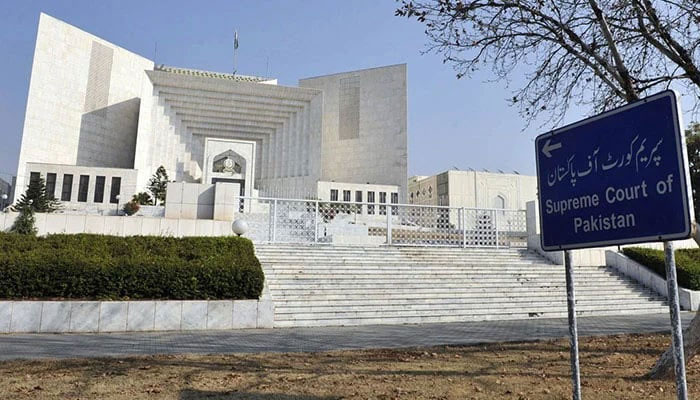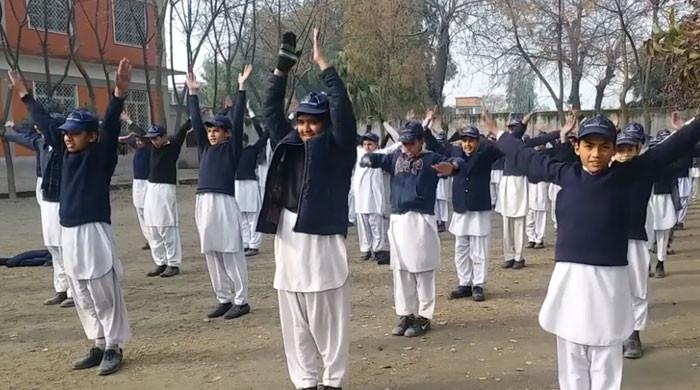 A board pointing towards the Supreme Court building. — SC website/File
A board pointing towards the Supreme Court building. — SC website/FileHailing the apex court's verdict on the Supreme Court (Practice and Procedure) Act 2023, various legal experts and analysts have termed Wednesday's decision as a positive development for the judiciary and preventing the "politicisation" of the top court.
It is pertinent to know that the SC full bench court — comprising all 15 judges of the apex court — announced the decision, after conducting five live hearings.
The SC decision — acknowledging the parliament's right to legislation under Article 191 — will be effective from April 21, 2023, the day it was enacted, which means the SC verdicts under 184(3), which came after this date, can be appealed for review.
Reading out the verdict, the Chief Justice of Pakistan (CJP) Justice Qazi Faez Isa said that that five members of the bench — Justice Ijazul Ahsan, Justice Muneeb Akhtar, Justice Sayyed Mazahir Ali Akbar Naqvi, and Justice Ayesha A Malik, and Justice Shahid Waheed — had opposed the law.
'Democratisation of Supreme Court' — Hamid Mir
The top judge along with his fellow judges has "democratised" the apex court by putting an end to the chief justice's "limitless" powers.
Through today's verdict, the door for politicisation of the SC has been closed which in the past was manipulated by dictators.
It'll be worth seeing how CJP Isa plays his role in ensuring the supremacy of law and the Constitution in the future.
Expected decision — Barrister Ali Zafar
It was expected that the majority of the judges would decide in favour of the SC (Practice and Procedure) Act 2023.
On merit, there was no doubt that such a law should exist that allows the right to appeal and devolution of CJP's powers with his senior colleagues.
Today's verdict sets out multiple legal points with the first one being that the Constitution is above everything.
The verdict also upheld parliament's supremacy and law-making powers, allowing it to promulgate any law while staying within the constitutional ambit while the interpretation of the law remains the discretion of the apex court.
But, the top court does have the right to exercise its authority if the parliament passes any law that is ultra-vires to the Constitution.
CJP Isa should be praised — Shahzeb Khanzada, senior analyst
It is a good decision and Barrister Ali Zafar (of the Pakistan Tehreek-e-Insaf) had also supported the law but wanted it to be done through constitutional amendment not by simple legislation.
He also said that reforms are needed in the superior judiciary.
CJP Qazi Faez Isa should be praised for showing a willingness to delegate his powers as we saw chief justices — including Iftikhar Chaudhry, Saqib Nisar, Asif Saeed Khosa, and Umar Ata Bandial — who centred all the powers in one individual and were not ready to delegate powers not even to their fellow judges.
They also did not convene full court meetings nor constitute full court benches which coined the term of like-minded judges.
The judiciary’s independence was being affected from within the judiciary.
But then a CJP assumes charge, convenes a full court meeting, forms a full court bench, starts live coverage of the proceedings, and says repeatedly that he doesn’t want to become ‘master of roster’.
And then comes the 10-5 verdict in which those judges who would become chief justice in the future like Justice Yahya Afridi and Justice Mansoor Ali Shah showed willingness to delegate their powers and opposed autocracy.
'Real aspect' yet to be seen — Barrister Ahmad Pansota
In my humble view, I think the decision to preserve that part of the law, which in essence was the good part, meaning thereby, the Supreme Court should be regulated and it should not rest in one man's hands, I think that part is appreciable, regardless of the fact that I still have reservations on the parliament passing this law.
Secondly, the greater the challenge was the appeal bit, which I believe has not been able to survive. This law on this count appeared to be class-specific, but it could not survive.
This is an interesting decision. The main part is to be seen once the final judgment comes out. But I think the real aspect has to be seen that after this judgment, what's the siphonage that parliament can make into the affairs of the Supreme Court of Pakistan?
'Best legal minds' — Mazhar Abbas, senior journalist
Only the best legal minds can judge the SC full court judgment o[f] 10-5 SC (court and procedure) Act, 202[3]. For the first time, people were able not only to witness the live coverage of the proceedings but also the verdict. Thank you.
'No shortage of law' — Lawyer Salaar Khan
For those who had been following the proceedings, this seemed the most likely outcome for the most part.
While many considered that the court might strike down the appeal in its entirety, fewer considered that it would only strike down appeals for cases already decided.
There’s little point getting into a more in-depth discussion on legal nuances until the detailed decision is out, but one thing is important to consider.
For all the discussion on the ‘divide’ within the Supreme Court, over the past five hearings, we saw that divide being articulated through consistently principled positions, grounded in particular understandings of the law.
For all its politics, in all of this, there was certainly no shortage of law.

 6 months ago
69
6 months ago
69





